Maureen Okpe
Stakeholders of the justice system have underscored the critical need of adequate funding, improved synergy and access to justice to effectively operate a fair system in Nigeria.
According to the stakeholders, this will not only enhance the efficiency of justice delivery but also strengthen public confidence in the system.
They said this, in Abuja, at the Access Justice Parley 2024, organized by the Public and Private Development Center, PPDC, with support of the U.S. Department of State Bureau of International Narcotics and Law Enforcement Affairs, with theme Advancing Effective, Innovative and Inclusive Justice Reforms in Nigeria.
The keynote speaker at the event, and Senior Advocate of Nigeria, SAN, Chris Umar said, the task of advancing effective, innovative and inclusive reform requires multifaceted efforts.
He noted inadequate funding to enable the provision of basic requirements to enhance the responsibilities of the various organs in the justice system was evident and needed to be addressed.
He said, “I have spent the last eight years, excluding the last one and a half, working on areas, fighting over budgets, fighting over timely releases of funds, all trying to ensure access to justice or improving access to justice.”
Speaking further Umar stated that, “over the past decade, efforts have been made to improve judicial processes and access to justice for all Nigerians. Various legislative reforms, policy initiatives and collaborative projects have aimed to reduce the backlog of cases, enhance transparency and improve the quality of legal services.
“The administration of Criminal Justice Act of 2015, which has been domesticated by quite a number of states, has been a milestone in modernizing the criminal justice administration, emphasizing the rights of defendants and efficient case management.
“Despite these efforts, substantial challenges remain.Persistent delays in court proceedings, case congestions and limited access to legal representation continue to erode public confidence in the judiciary or in the justice system.”
Attorney General of the Federation, AGF, Lateef Fagbemi, represented by the Special Senior Assistant to the President on special duties Wada Ahmed Wada, acknowledged access to justice remains a fundamental right and a cornerstone of democratic governance.
Fagbemi said, “we recognize that innovation and inclusivity are not mere buzzwords, but essential elements in creating a justice system that truly serves all Nigerians. The collaborative platform provided by this parley is invulnerable in fostering the exchange of ideas and best practices across our jurisdictions.
“The theme, Advancing Effective, Innovative, and Inclusive Justice Reforms in Nigeria, resonates deeply with our collective aspirations for our justice system and reflects the pressing need for evidence-based reforms in our sector.”
For her part, the Chief Executive, PPDC, Lucy Abagi, charged the government to take proactive stand by partnering with civil society organizations to allocate adequate, budgetary resources for the court organization at both the national and sub-national levels.
She stated that, when justice is out of reach, insecurity and poverty become the order of the day. Lamenting delays in judicial processes which frustrates users and diminishes likelihood of timely justice.
“These delays have also contributed to the rising number of pre-trial detainees in detention centres, a growing concern for human rights.
Additionally, inadequate evidence-handling practices and the absence of proper storage facilities often result in compromised evidence, undermining investigations and sometimes leading to wrongful acquittals.
“Court proceedings face systemic challenges such as ineffective notification systems and poor coordination in scheduling, which cause key participants to miss appearances, blocking case resolutions unnecessarily.
“The administration of court is further burdened by inefficiency, as poor communication and coordination among administrators leads to errors and delays that effect justice delivery.”
Also, Executive Secretary, National Human Rights Commission, NHRC, Tony Ojukwu, reiterated, access to justice as the foundation upon which human rights, democracy and social equity are built.
He said, “Justice is the access to which the vulnerable finds protection, the marginalised gain voice, and all Nigerian receive dignity. Without meaningful access to justice, our work to promote human rights will be incomplete and ineffective.”
Inspector General of Police, IGP, Kayode Egbetokun, restates the forces commitment to promote justice and fairness, recognizing the importance of access to justice while upholding the rule of law.

